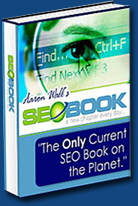Testimonials
"I was thinking about you all day today and what a great
person you are."
"I wanted to be #1...After 2 months I reached the top position for my most
popular keywords."
Read
More...
Above The Fold!
The SEO Book

PPC Information
Need Links?
Need Traffic?
Use these Free PPC CouponsSEO Tools
WordTracker - keyword suggestonOther Meta Tags
There are numerous other meta tags that I typically choose not to use. Most of the other meta tags are used for screening to a region, language, rating, content type; or to further define who created the tag or owns the web site.
Why I Don't Use Most Other Meta Tags
Since the purpose of most of these other meta tags is to screen people away, can you think how that would help your business model? Bandwithd is really cheap. More traffic doesn't usually cost any additional money. Granted most people from China will not be buying your fur coat this weekend, but I said most. Nothing is a certainty but death, war, and taxes.
As soon as you start fragmenting your own viewers, and filtering some out you are guaranteed to loose traffic and probably money. That guy in China may be a prince and he may have a language translating web browser at his fingertips. Surely you will not know the scenario if you start placing some of those other tags in your page.
In all honesty most of the tags are ignored anyway.
Search Engines & Meta Tags
Currently search engines usually ignore most meta tags. There are only a few important meta tags which are read by any of the major search engines.
Important Meta Tags
the big three meta tags are:
- title tag (extreme importance. shows in search results and at top of the page!)
- meta description tag (moderately important. sometimes appears in search results.)
- meta keywords tag (this tag is not even used by most search engines though)
List of Many Meta Tags & Other Tags
<META name="Abstract" content="Abstract phrase"> (most likely intended to be an abstract of the meta description tag.) nobody really uses this tag
<META NAME="AREA" CONTENT="Culture"> (directs content to a specific part of the populous)
<META HTTP-EQUIV="AUDIENCE" CONTENT="Expert"> (directs content to a specific part of the populous)
<META name="Author" content="your name"> (this is good for an ego feed if you make a nice site, or want people to be able to find you to hire you as a copywriter, but it probably will not help you rank any better)
<META HTTP-EQUIV="Content-type" CONTENT="text/html; charset=ISO-8859-1"> (this defines the content type, and you defiantly should have this installed especially if you are using an abnormal character set)
<META NAME="CONTRIBUTORS" CONTENT="you and me"> (see author tag)
<META name="Copyright" content="Copyright Statement"> (This is good for an ego feed if you make a nice site, but it probably will not help you rank well. Copyright is already granted as soon as you write copy. There is no need to use this tag.)
<META NAME="CREATOR" CONTENT="fred's tool page creator"> (used to attribute the software or person who made the page)
<META name="Distribution" content="Global"> (could also be local or iu. the search engines assume global unless told otherwise)
<META name="Expires" content="Wed, 08 Jun 2015 19:58:02 GMT"> (this ends your site publishing after an event is over. the only reason to use this tag is if you have expiring content.)
<META NAME="FORMATTER" CONTENT="rdrdf"> (see author tag)
< META NAME="GENERATOR" CONTENT="www.who cares">
(see author tag)
<META HTTP-EQUIV="Content-Language" content="EN"> (default setting is english, but search engines can determine the language by reading the words on the page)
<META HTTP-EQUIV="Pragma" CONTENT="no-cache"> (tells the spider not to cache the page)
< META NAME="OWNER" CONTENT="a@b.com"> (see
author tag)
< META NAME="PLACENAME" CONTENT="dfasd"> (serve
little, if any purpose)
< META NAME="PUBLISHER" CONTENT="dfasd"> (see
author tag)
<meta name="rating" content="general"> (not required)
<META NAME="revisit-after" CONTENT=4 days> (the robots are usually going to do what they want, you offering orders to them will usually do nothing)
<META NAME="SUBJECT" CONTENT=""> (gives subject, rarely used not really supported)
<META HTTP-EQUIV="Window-target" CONTENT="_top"> (forces site out of frames or to the top. this prevents people from framing your content.)
The link tag helps the user and browser through a series of documents, or can be used to link to external CSS stylesheets and things like that.
<LINK rel="Next" href="chapter4">
<LINK rel="Prev" href="chapter2">
<LINK rel="Start" href="begriming">
<LINK rel="Glossary" href="glossary">
Or the link tag can be used to provide browser specific alternatives. This tag can be used to make your data available across different media types.
<LINK title="Text-only version"
rel="alternate"
href="text_only"
media="aural, braille, tty">
Other Random Tags
<NOFRAMES> tags - tags used to provide content description to webcrawlers. place noframes tags on page with the <frameset> tag. Many times people throw tons of "spam" in this (similar to the noscript tag).
<frameset cols = "25%, 75%">
<noframes>
<body>Your browser thinks frames are evil! (or whatever text you
want to enter)...</body>
</noframes>
<frame src ="a.htm" />
<frame src ="b.htm" />
</frameset>
NoScript tags - tag tells the browser what is in an undefinabale script if they have that script language disabled or the script fails to load.
<SCRIPT type="whatever">
...some script...
</SCRIPT>
<NOSCRIPT>
<P> view <A href="http://whatever.com/data">bla.com</A>
</NOSCRIPT>
Conclusion About Most Meta Tags
That should be most of them, and most meta tags are a waste of time or I would have included them in the meta tag generator tool. There is no standard list of META properties, so authors may define whatever metadata they like.
There are a bunch of other meta tags out there and the language XML is an extensible markup language which allows the creator of each document to define each tag and its attributes. For more info on other tags visit the W3C.
|
robots exclusion
<-- |
--> make meta tags |
Want Free Keyword Research Software? if yes click here
![]() Got
SEO Questions? Get Answers in Minutes NOT Days
Got
SEO Questions? Get Answers in Minutes NOT Days
Read the SEO Book blog today for the latest SEO tips.
Search the archives for specific posts
You may also want to ask your questions at the SEO Book community forum.


